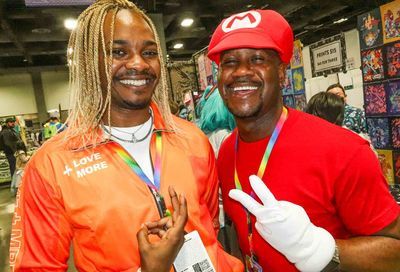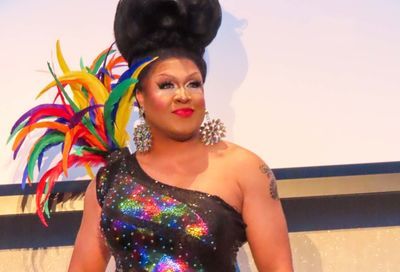 Barbara Chinn (Photo by Patsy Lynch)
Barbara Chinn (Photo by Patsy Lynch)
Despite the anticipation of the Jan. 20 change in presidential administrations, generally much welcomed by the GLBT community, there is more than enough grimness to go around. Take the District’s ongoing infamy as Ground Zero in the fights against HIV/AIDS, or the bleak fiscal news. Combine the two, and you have a glimpse into the start of Barbara Chinn’s year.
For a more complete picture, also picture the 64-year-old lesbian scrambling just two days into the new year, trying to find a plumber to fix her elderly father’s water heater. If there’s any upside to having been laid off from 21 years of employment with Whitman-Walker Clinic, it could be that she’s got the time to help her father.
”The way I see it, it can only get better,” says Chinn with signature optimism, despite Dec. 31 marking her last day as the director of WWC’s Max Robinson Center in Southeast. The recession has taken its toll on the clinic, and Chinn was part of a recent wave of layoffs that did not include severance. ”I’ve got high hopes and I’m looking forward to a good year.”
Along with Chinn, Dr. Pat Hawkins, a licensed clinical social worker and psychologist, also lost her job as WWC associate executive director for policy and external affairs. Though, like Chinn, Hawkins received no severance, the clinic will pay severance for union employees who are not called back within six months, as required by their negotiated labor agreement. At 68, Hawkins says she’s at least grateful to qualify for Medicare — not yet an option for Chinn.
While they may not share the benefits of Medicare, the two will share the honor of being celebrated by members of the community at a special tribute now being organized.
Mark Meinke, a member of the Max Robinson Center’s Community Advisory Committee and a founder of the Rainbow History Project, the local GLBT archive and awareness effort, is among those behind the tribute.
”Barbara’s been at the clinic for 21 years. Pat’s been there since 1984, as a volunteer for her first three years,” Meinke points out. ”If it hadn’t been for Barbara Chinn, the Max Robinson Center probably wouldn’t have gone very far east of the river. She was able to build relationships with people who didn’t want a relationship.”
Chinn says that as yet, HIV/AIDS outreach and awareness is job that’s far from finished.
”I hope [the clinic] will find someone to continue on with the effort,” she says. ”There are some [Southeast churches] that are opening their ears and their eyes and their hearts to HIV and the needs of persons with HIV. But there are still others that don’t want to talk about it. They associate it with homosexuality or drug use. … The ones who have not been as open-minded still need people to address them, to work with them until they are able to come across some means of getting through to them.
”You have parishioners in your church, whether you realize it or not, who are infected or affected by this disease. When you say you don’t have anybody [who is HIV-positive] in your church — well, if I was a member of your congregation, I’d be a little reluctant to share that fact with you.”
For the work that she has done, Chinn was recognized by RHP as a ”community pioneer” of the local GLBT community in 2007. Hawkins was also nominated in 2007, but was away on travel at the time and was unable to accept her nomination. Meinke guesses that Hawkins will join the pioneers’ ranks this year.
In the meantime, there is this tribute to which she and Chinn may look forward.
”I think it’s very nice,” Hawkins says of this grassroots plan to recognize her and Chinn. ”It will give us some sense of closure. It’s also hard for those of us there for a long time, totally dedicated to the mission of the clinic. It was so much of our lives for so many years.”
Chinn, while praising Hawkins work on Capitol Hill and elsewhere as a spokesperson, advocate and educator, is quick to downplay her own position on the frontlines against HIV and AIDS in D.C., showing kindness and supported to the afflicted back in a time when stigma and fear was far worse than it is today.
”I’m humbled by the fact that somebody wants to recognize my efforts, but I don’t see that I’ve done anything that fantastic,” says Chinn.
Chinn’s humility may be matched, however, by Meinke’s anger. He and others in the community have criticized both the timing of the layoffs and the absence of severance.
”I was outraged,” he says bluntly. ”I still am.”
Hawkins says she knew the clinic was running a budget deficit, but that she hoped more revenue-generating plans could’ve been tried before resorting to layoffs — the second wave since the start of 2008.
”They could’ve given us more heads up, more transition time,” says Hawkins. ”After that many years of service, I think they owed us more.”
Chinn, who has already sent a letter to the MRC Community Advisory Committee asking for their continued support for both MRC and WWC, may be moving, ironically, from clinic administrator to client.
”I wish only the best for the clinic,” says Chinn. ”The clinic is in a period of reorganization. What it will ultimately look like, I don’t know. I can only hope that it continues with the mission of serving the needs, the health care and mental health care needs, of the LGBT community and anyone else who wants services from the clinic. It has good providers, good staff.
”As a staff member, I didn’t go there. As a private citizen, shall we say, it may turn out to be an option for me. I don’t know. I know they have some doggone good doctors there I would trust with my life.”
The Rainbow History Project will sponsor a Celebration of the Contributions of Barbara Chinn and Pat Hawkins on Friday, Feb. 20, at 6:30 p.m. at Covenant Baptist Church, 3845 South Capitol St. SW. For more about RHP, visit www.rainbowhistory.org.




















